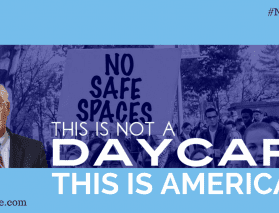What I think happened with Benghazi is not some vast conspiracy to undermine the US by President Obama or some CIA op to sell guns to terrorists or whatever other theories are out there. I do think there was a conspiracy. But it is a conspiracy that affects us all and began in Eden so long ago.
It is the natural tendency of each of us as fallen human beings to deflect, conceal, and cover when confronted with our failures. It’s what Adam and Eve did. It’s what I tend to do. Every person I have ever encountered naturally leans toward self-preservation as the first priority.
Even if you think we all evolved from a pile of goo in a godless universe, you’ll likely agree that our first instinct is to protect our own interest, our own well-being. For that reason, we rightly praise those who put others ahead of themselves. We exalt those souls brave enough to push past that instinctive reaction and speak truth, even when it’s not in their own best interest to do so.
I’ve Heard this Story Before
For more than a decade, I dealt with thousands of people, students of all ages as well as parents and teachers in just such situations. As a school principal, I was usually the one tasked with confronting people when they had done, or were suspected of having done, something unwise or wrong. Almost without exception, the person’s first reaction when confronted was to stake out a position of self-preservation at all costs. I learned over the years to intentionally let them know that I understand that instinct — before I ever asked them for an account of what happened. As Christ followers who embrace a Biblical portrayal of us all as broken human beings, we should expect ourselves to respond in that fallen way, to naturally love ourselves more than others and God. And more than the truth.
I confess that I have been guilty of it at times. I think we’d all admit we’ve been there, done that. Even if we’re not proud of it.
It never ceased to amaze me the lengths to which people would go to avoid the consequences of their actions. I could recall hundreds of incidents as examples, but one will suffice. A certain student had been working in an area of the school building that he/she shouldn’t have been. A teacher had given clear instructions not to be there, but he/she had been there anyways — and got caught. Frankly, it wasn’t that big a deal, although direct disobedience of an authority figure should have some consequences.
But instead of taking ownership for the fault when confronted by the teacher, the student immediately tried to deflect the blame by concocting a mysterious new office staff person who allegedly gave him/her permission to be there. He/she described this person in great detail, though he/she had never seen the person prior to that day. He/she even told me exactly where in the office area the alleged exchange took place. We talked at length as I took pains to understand all I could about the mysterious stranger who had infiltrated a school office – a cause for great concern indeed, if true. Candidly, I quickly grew tired of the whole thing and was tempted to just let it go rather than try to get at the truth.
A Page from Colombo
The account was quite elaborate and, frankly, pretty good for being created on the fly. It even had me second-guessing myself on a few occasions. Finally, in a page torn from Colombo, I told the student he/she was free to go. As he/she had a hand on the doorknob to leave, I couldn’t resist:
“Oh, there is one thing that’s puzzling me.”
“What’s that?”
“Well, there’s something I can’t quite figure out. Maybe you can help me understand.”
“Sure.”
“Well, I just can’t seem to understand how it is that you could describe this interaction with this person in such vivid detail in this location and yet, when I watch the security camera footage, I see you clearly enough, but I don’t see this other person that gave you these conflicting instructions. I just can’t seem to figure out how the camera could see you clearly, but not this other person. At all. Anywhere.”
Long pause.
“You can see why I’m confused?”
Needless to say, the student returned to the seat and the conversation unfolded from there. Thankfully, it ended with him/her confessing what I had know all along. He/she had panicked and offered an alternate explanation to avoid consequences. He/she had instinctively sought to deflect, cover, and conceal. I understood it. Didn’t approve, of course, but I understood it. We couldn’t make any progress until she had chosen to acknowledge her failure.
The Mysterious YouTube Video Defense
I think it is likely that something similar happened in regards to Benghazi. No, I don’t think some vast left-wing conspiracy was at work. I could be proven wrong, of course, but I have usually found that the simplest explanation consistent with the facts and human nature proves to be the most accurate explanation for what happened.
So here is what I think happened with Benghazi. Note: this is my opinion. Don’t take it as gospel. Don’t quote it as fact. It involves public figures who have made public statements about public events and their accounts of what transpired. Some may accuse me of pre-judging and not being Christ-like (always a favorite when Christians state an opinion on anything), but here is my simple assessment that offers an uncomplicated, and therefore more likely, take on what happened and why.
In short, I think that the Obama Administration took a risk with a lighter security footprint in Benghazi. I think the decision was likely made for political reasons in keeping with the Administration’s record of minimizing US visibility globally. Giving them the benefit of the doubt, I actually understand the concern of not wanting it to appear that the US was running things in Libya. I understand wanting to keep a low-profile.
But I think they chose a profile so low that it put State Department officials in harm’s way. It would seem from the testimony heard before Congress last week, that only the Secretary of State could override those minimum limits of security and permit State Department officials to be in that position. It seems that such a calculated risk would have to have been made by Secretary of State Clinton by statute.
We can argue about whether or not her/her Department’s decision was wise, but, at the end of the day, sometimes you have to make tough calls in such situations. She has the authority to override those requirements. It’s her call. Perhaps surprisingly for some, I don’t find her somehow criminally culpable for that decision. I think it a poor one based on misplaced values that ultimately resulted in the deaths of four Americans. Tragic, yes. Criminal, no. We elected the President who put her in position. We must accept the consequences of her decisions.
But so must she. And so must the President. The reason I am concerned about Benghazi is what happened after it became obvious to all that the security had been insufficient. In other words, once it came time to face the consequences of the calculated risk, the blame-shifting began. Frankly, if President Obama had gone on the talk shows five days after the event and said that a calculated risk had been made in an effort to respect the sovereignty of Libya — instead of sending Susan Rice with stories about a You Tube video — we likely wouldn’t be talking about Benghazi now.
But Mitt Romney might be the President. I say that not to suggest that Benghazi could have been a tipping point in the election, but to make clear the high political stakes in play at the time of the attack and the need for an alternate explanation of some sort to deflect blame.
It’s the Cover-up, Stupid!
The YouTube story sounds a lot like that “mysterious stranger” version I got from that student many years ago. If what happened in Benghazi could not possibly have been predicted, what culpability could possibly be placed on anyone? How could they have know a spontaneous protest would erupt inspired by some crazy video that just happened to incite a riot, or something?
By trying to deflect all blame, someone(s) instead invited greater scrutiny when the deflecting story didn’t fit the facts on the ground. It was another calculated risk taken without any one person necessarily ever having to say that it should be done. Given the politically charged climate, no conspiracy was needed, just the common desire shared by the key decision-makers and their staffs to try to deflect as much blame as possible and limit the fallout. Rather than accept responsibility for the failed approach, another story began to percolate, perhaps simply through a growing group-think process, that could potentially deflect all responsibility. A dozen edits later, whose to say exactly whose hands wielded the editing pens that did the deed?
And the President need know nothing about it. That’s right. I really do not think the President knew of the cover-up. Like Reagan with Iran-Contra, the President often gets insulated from what he heeds to know. It’s a reflection on Obama’s failed leadership, just as it was on Reagan’s at the time. But I do not think Obama intentionally lied about Benghazi. I just think he wasn’t told the truth.
What I am saying is that what happened with Benghazi had little to nothing to do with partisan politics and everything to do with a failure in leadership and revelation of flawed moral character by those on the team. The moral short-coming could have happened on the watch of Republicans — and it has in the past –and it would have been the same moral shortcoming. A crisis doesn’t determine who we are, it exposes who we choose to be.
Let’s Not Make It Worse
When it became obvious that the worst had happened, I think a decision was made early on in the process to try to limit the fallout — a natural reaction we all would have likely desired. Hence the decision not to send the counter-terrorism (FEST) team. Hence the decision not to insert more military assets to potentially make the situation worse with a higher US body count.
Who made it? I don’t know. It could have been a collection of people in the process. Was the President at all involved in that decision process? I don’t know. He certainly should have been, but may not have been included. It wouldn’t be the first time a President was left out while his team tried to fix a problem without him. We know from Hicks’ account that Hicks spoke with Clinton personally at 2 AM local time Sept. 12 while the attack was still unfolding.
I understand the leadership thinking that “the damage is done. Let’s not make it worse.” Even though I do not agree with that approach on principle, I understand it. Elliot Abrams even offered a very plausible explanation as to why the four soldiers led by Col. Gibson might not have been permitted to go to Benghazi as reinforcements He suggested that military leadership may have decided they were needed to protect the personnel there in Tripoli. Makes sense. If that is what happened, it should be easy enough to find out.
But when we choose to embrace an alternative explanation for which there is no evidence — some might call that a lie — we up the ante. We actually increase the risk of greater consequences if our deception is found out. But if it works, we avoid consequences altogether. Greater risk, but greater potential political rewards.
In this instance, the cover story failed for lack of evidence. And so the risk of greater consequences has increased.
My Summary Opinion on Benghazi
- The State Department took a chance with a lighter security footprint in Benghazi than that required by State Department regulations.
- When it became obvious that the worst had happened, no support was sent in order to minimize the fallout.
- A false narrative about a video and protest was offered by the Administration to deflect attention from that security decision.
That is what I think happened with Benghazi. It’s simple. It fits with my understanding of fallen human nature.
No, I don’t think President Obama should be impeached — at least not with the evidence we’ve seen to this point. Nor do I think that the GOP would even try. This President could get away with a lot before impeachment ever became an issue due to the political fallout of the Clinton impeachment fiasco in the late 1990s.
But I do think his Lincoln-esque plan to keep his political enemies (Hillary Clinton) close has come back to bite him. Lincoln, he is not.
I suggest reading Wendy Murray: Why Benghazi Matters. And in case you missed it, my recap of the Benghazi whistleblowers’ testimony.











